The best new albums this week
Your guide to the essential releases
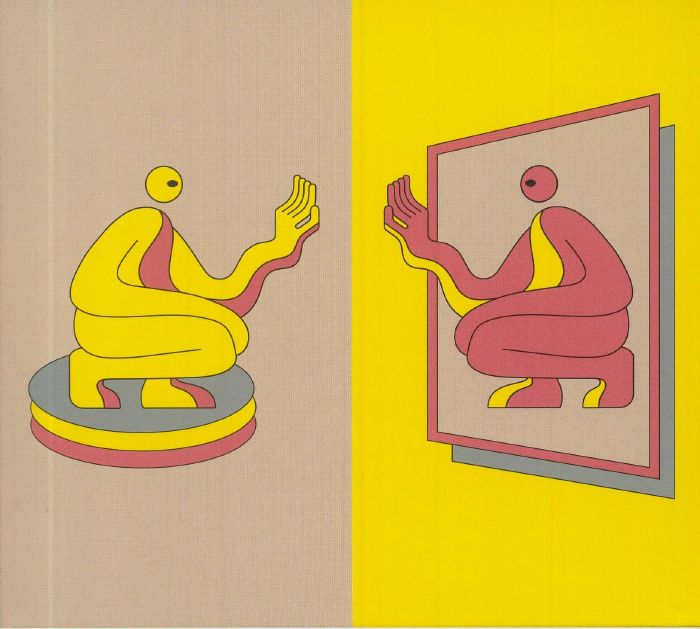
ALBUM OF THE WEEK
DJ Seinfeld – Mirrors (Ninja Tune)
Swedish producer DJ Seinfeld is back in long-playing action with the release of his second studio album, ‘Mirrors’. The carefully constructed collection follows an extended period of sonic R&D, and admirers of his back-catalogue are likely to discern a tangible progression in his already potent sound signature.
After emerging as a roundly-admired member of the lo-fi house movement in and around 2016 – alongside Ross From Friends, Mall Grab et al – Armand ‘DJ Seinfeld’ Jakobsson released his debut album ‘Time Spent Away From You’ in 2017 to critical acclaim. Winning admirers across the board, not least from heavy-hitters Flying Lotus, Bonobo, and Flume, the break-up themed album scored plenty of press points too – with Rolling Stone and Pitchfork among those joyfully singing its praises. Seinfeld’s early successes led to a tightly packed touring schedule, with a torrent of bookings to perform at marquee events including Glastonbury, Coachella, Warehouse Project, and Sónar, among many others. 2018 saw him inducted into the DJ Kicks compilation hall of fame – a select clique reserved for only top tier jocks – and a year later he launched his Young Ethics label before being summoned to provide an Essential Mix for UK Radio One.
The good times were well and truly rolling, but as all but the luckiest of souls will be acutely aware, even while surfing the crest of a wave, life has a habit of blind-siding each of us with unexpected obstacles. Family misfortune would force a change of pace for the high-flying artist, and – following his father suffering a recent stroke – Jakobsson began spending a good deal more time at home in Malmo to help provide care and support to his recovering patriarch. Far from signalling a premature end to his soaring career in music, Armand embraced the opportunity to re-connect with loved ones while channelling his freshly nurtured vigour into honing his production techniques.
After an extended period of sometimes arduous sonic exploration, Seinfeld re-surfaced with his deeply personal new long-player, and though the tone of the music is still recognisably his own, it’s clear the time he spent diligently perfecting his craft has been thoroughly worthwhile. Named after a quote from his favourite author – Argentine novelist Julio Cortázar – ‘Mirrors’ sees Jakobsson in a palpably reflective mood. There’s a polished production sheen throughout the ten-track collection, with music that ranges in theme from unquestionably cross-over leaning to searingly introspective.
The album commences with a distinct UK flavour, with the two-step/ broken beat hybrid ‘She Loves Me’, with its haunting vocals, spacey pads, and majestic synth lines. ‘Walking With Your Smile’ continues the garage feel, with a complex assembly of blissed-out chords, delicate piano leads, house organs and vocal cuts cascading over rolling drums. Arguably the most pop-friendly of the collection is ‘U Already Know’, with honeyed vocals exploding over ultra-contagious bass, leviathan synth work and slick rhythms. Reverb-soaked vocals are an obvious feature of the album, and the ethereal atmosphere they bring is ramped all the way up with the brooding harmonics of ‘The Right Place’, before the transcendent interlude ‘Home Calling’ provides wholesome respite from the generally floor-friendly ensemble.
‘These Things Will Come’ is next to arrive with its wobbly synths, deep bass and rousing strings, before ‘Tell Me One More Time’ harks back to a vintage era – albeit with an unmistakably modernist gloss – with immersive organs and power chord stabs combining with the now-familiar panorama-filling string/synth blends. The vivacious synths, silky vocals and affecting breaks of ‘Someday’ prove to be another instantly memorable standout, before Seinfeld’s intricately composed musicality extends into the moody pop-house of ‘I Feel Better’. Finally, closing track ‘Song For The Lonely’ appears thick with melancholy, as dramatic chords, enigmatic synths and choral vocal effects rise over a fierce kick and pumping, syncopated rhythm.
There’s plenty to enjoy here, with fans of the more accessible end of electronic music equally likely to find favourites among the collection as strict underground devotees. Clearly, DJ Seinfeld’s concerted period of close personal reflection and sonic refinement has been time very well spent.
PC
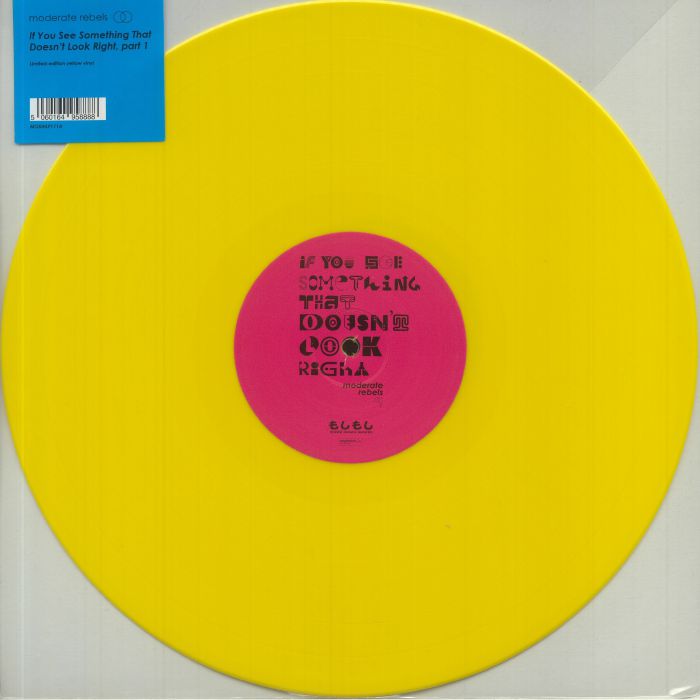
Moderate Rebels – If You See Something That Doesn’t Look Right Part 1 (Moshi Moshi)
It’s ambitious for Moderate Rebels to release an album in 3 parts, especially when this move comes so early on in their career. But this collective aren’t deterred. ‘If You See Something…’ forms their monumental third album, following the comparatively average drone-rock albums ‘The Sound Of Security’ and ‘Shared Values’. Unlike those, it’ll be released by the end of this year in 10 track phases. Parts 1 and 2 are out, and while 3 is yet to come, we couldn’t help but rave about this project as it unfolds.
The most unique aspect of this music is the cultlike polyphony of the band’s vocals, drawing on the techniques of their influences like Spiritualized and Stereolab. MR like to double, triple, quadruple their jangle-pop lyrics, ad infinitum, giving the whole thing an ominous mood. Behind the indie rock uplift, there’s something looming there, recalling the folk muderousness of the film Midsommar; it’s like the band are dancing around us in psychedelic, predatory reverie. Its themes unfurl slowly – the punk-house hit ‘Higher Than The Hierarchy’ is obviously about transcending the prison of social status through spiritual ecstasy.
But these moments are rare. Most tracks are folk tunes that occur in endless ritual rooms, like ‘The Penultimate Truth’, which reaches postmodern conclusions like “you represent no-one except yourself”. Many tracks are taunting and forced, like ‘These Are The Good Times’, whose eponymous refrain contrasts knowingly with the opening statement “what’s the matter, steroids got you deaf?”. As the band put it, this album is about insincerity, and they nail the mood perfectly.
JIJ

Turnstile – Glow On (Roadrunner)
The meteoric rise of Turnstile has felt a little bit like witnessing history in the making. The Baltimore hardcore punk outfit started making waves roughly a decade ago with a slew of EPs that simultaneously managed to pay homage to genre foundations such as Bad Brains and Gorilla Biscuits, while slowly yet surely unravelling layer after layer of sonic nuance.
Rejecting major label Roadrunner Records’ offer to release their game-changing debut, ‘Nonstop Feeling’, back in 2015, was certainly a bold move, but one that allowed the group to graft and build upon their DIY ethos from a much more visible, grassroots level.
Taking the label on for the explosive sophomore effort, ‘Time & Space’, all but hurtled the band towards stratospheric heights, which they’re now set to capitalise immensely upon with the highly anticipated, ‘Glow On’.
Enlisting the prolific Mike Elizondo as producer, whose credentials stretch from 50 Cent to Rilo Kiley, the mission to turn hardcore punk into a global entity has never seemed more fully realised than across these 15 tracks, clocking in at a whopping 35 minutes. What may seem like a short endeavour to most, is actually the lengthiest Turnstile project to date; an exploratory opus that constantly shifts between dream-pop (the blissful Blood Orange featuring ‘Alien Love Call’), neo-soul (the bubbly ‘No Surprise’) and surf rock (complete with lap-steel style licks on the retro-assault of ‘Fly Again’), while never misplacing its identity as a hardcore record.
Directed by the endlessly intriguing and creative frontman Brendan Yates, the captivating accompanying short film, ‘Turnstile Love Connection’, inspired equally by the early works of Spike Lee and Suicidal Tendencies music videos, showcases 4 of the album’s strongest cuts through grainy lenses, curious cinematography whilst unable to help but feel like the punk answer to The Who’s ’Tommy’.
With Yates also serving as co-producer to ‘Glow On’, it’s evident how much his bandmates have been pushed to the furthest reaches that their scene has ever questioned itself capable of, leaning into emotive, lush, and at times, soaring vocals, with succinct yet deeply insightful lyricism. By offsetting the aggressive, transcendent, camaraderie that their massive, riff-heavy, ludicrously catchy anthems demand, a new shape of punk to come seems to have all but arrived.
ZB
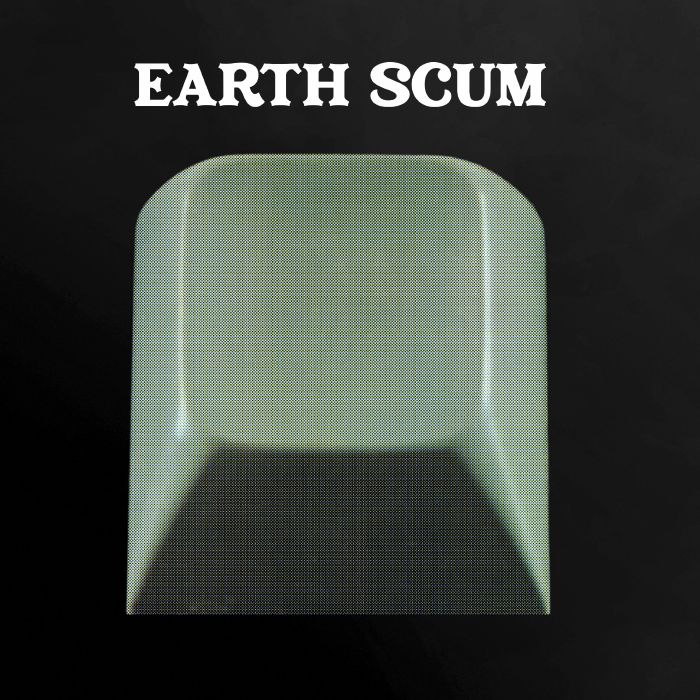
FYI Chris – Earth Scum (Black Acre)
Scattering themselves amongst a clutch of respected underground labels to keep their options open, FYI Chris approach their debut album with a degree of freedom. They’ve established a sound of their own which has made appearances on Rhythm Section, Church and West Friends. It’s a flexible approach which feels rooted in jazzy house and broken beat, but has a certain snap and swagger to keep in step with the rougher end of UK club music. Now sidling over to Bristol label Black Acre, they’re offering a broad view on club music that neatly juxtaposes the rough with the smooth.
More than anything, the album format has presented FYI Chris with the opportunity to cast themselves as more than just a duo of northerners making tunes in Peckham. There’s a rolling cast of vocalists, from Pinty and Simeon Jones to Thick Richard and DJ Morris – all friends living in their vicinity as opposed to pointed or contrived link ups with hotly tipped ‘names’. Much like the recent Joy Orbison mixtape, this familial approach adds a certain sincerity to the music, providing a window into the real world the artists reside in.
The singers and rappers are just a small slice of what Earth Scum is about though. It’s still primarily a vehicle for FYI Chris’ dexterous, densely packed trips through dancefloor styles. ‘Black Dragon Loop’ (which preceded the album as a single) is a sizzling, driving slice of motorik action which comes on like the en vogue ‘chug’ sound jacked up to 130bpm. ‘Tempora’ drags the duo’s jazzy tendencies through a grimy filter which lends the chords a dubby quality, albeit in the context of a sprightly, crooked broken beat. With space for backroom acid diversions, dishevelled bleeps n’ breaks, subtly tripped out beatdowns and an extravagant jungle-poetry finisher, we ride through to the other side of FYI Chris’ album knowing a little more about the depth and breadth behind these two artfully inventive artists.
OW

Palmbomen II – Make A Film (World Of Paint)
Anyone following the work of Kai Hugo’s Palmbomen II project up to this point probably gets similar imagery flash up in their heads at the mention of his name. As an artist with a focused approach to aesthetic, Hugo has pointedly shaped up a world for Palmbomen II to reside in – one rendered in over-saturated VHS film stock, low budget public access surrealism and an imagined Californian dream state. That was especially the case on his Memories Of Cindy series for Beats In Space, but equally the analogue warble on his collaborations with Betonkust have a similarly stylised quality. Even last year’s Cindy album, which found Hugo building on his Cindy Savalas concept with vocalist Blue LoLãn, featured videos which took a dated approach to CGI and wound up draped in the same retro-fetishist veneer.
Now Hugo makes his first Palmbomen II outing on his own label, World Of Paint, and he steps out of his own fantasy zone to encourage listeners to create their own. The concept for Make A Film is a smart one. The 24 pieces on the record function as a kind of library music, with titles like ‘Positive Steel Drum’, ‘Slightly Dark’ and ‘Medium Melancholy’. The sleeve meanwhile comes with a ‘Make A Film’ manual, featuring six steps to follow to develop a concept for a film. It’s rendered slightly tongue in cheek, with more than a whiff of Hugo’s well-established 80s aesthetic, but it’s actually designed to be used, as well. The manual suggests the music can be used as inspiration as well as soundtracking the resulting film projects, albeit not for commercial use. More than a gimmick, this feels like a practical tool that could encourage people to engage with their creativity, if they’re so inclined.
Of course, music in any film has an overbearing influence on the atmosphere of a scene, and Hugo’s sound remains happily wallowing in fuzzed and phased-out synth refrains. As such, you could take this album as a move to greatly expand the Palmbomen II universe, as amateur cinematographers set their own moving image to Hugo’s sounds. Lo-fi 80s sound and vision still holds weight when handled in the right way, and a project like this throws up unknowable possibilities for how that strong sonic characteristic might be used.
OW

Arpanet – Inertial Frame (reissue) (Record Makers)
In some ways Gerald Donald will always be one half of Drexciya before anything else. When you create something as profound and widely adored as he did with James Stinson, it’s not easy to shake off the association. But what Drexciya achieved in expanding the parameters and possibilities of electro set the stage for what Donald would go on to achieve afterwards. Across aliases and collaborative projects such as Heinrich Mueller, Dopplereffekt, Japanese Telecom and Der Zyklus, he’s plunged boldly into abstraction as much as upheld his distinctive strain of groove-oriented electro-funk, depending on the particular project or intention.
Arpanet is one of the most starkly realised of Donald’s projects, first emerging mere months before Stinson passed away in 2002. On the first album, Wireless Internet, Donald sharply addressed the techno futurism which is now our every day reality, and he did so with a trademark noirish electro minimalism that maintained the funky roots of his work. Three years later, the second Arpanet album Quantum Transposition jettisoned most recognisable frameworks and explored a steely, avant-garde abstraction of the Drexciyan mode. It’s the same surefooted progression into experimental realms Stinson himself exercised on his final record as Transllusion, L.I.F.E., and it’s perhaps no surprise to learn both records were released on Rephlex.
Then we come to Inertial Frame, the third and ostensibly final Arpanet album, now reissued by the French label which originally released it, Record Makers. If Quantum Transposition wilfully cast into the unknown, here Donald returned with his findings. The sound was more tangibly rendered, but permanently altered, in the same way Dopplereffekt was forever changed after the striking experimentation of Calabi Yau Space. There were moments of outright structure, such as ‘Axis Of Rotation’ and the gorgeous ‘Infinite Density (Edit)’, but the low down Drexciyan funk was replaced by a need to express complex ideas around quantum physics and technology through the medium of synthesis and sequencing. Crucially though, Inertial Frame remained musical even in its wilder moments, contrasting the metallic severity of its predecessor. Most compelling is perhaps not how different the album sounded, but how much of Donald’s fundamental signature came through even when things got positively weird.
OW
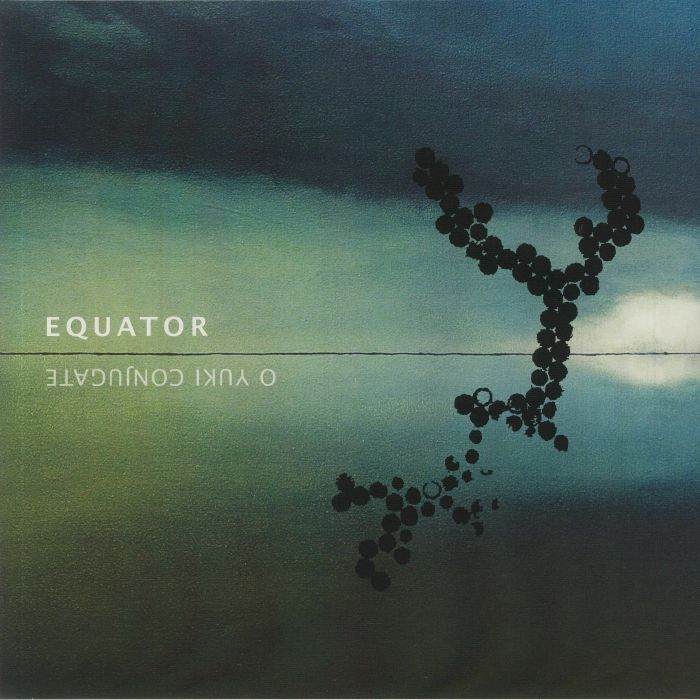
O Yuki Conjugate – Equator (Aguirre)
When you think about the oddly exotic yet reclusive world of O Yuki Conjugate, there’s something pleasantly fitting about one of their mid-era albums being reissued on Aguirre. The Belgian label carries music which seems born from the same stew of outernational mysticism – shadowy drum incantations and drone escapism shot through with a smudged beauty. Truthfully, O Yuki Conjugate were well off the radar before their work started enjoying a fresh airing in the great reissue gold rush, but the prescience and unfaltering excellence of Roger Horberry and Andrew Hulme’s project has landed with a startling relevance. We’re not short of meditative musicians exploring the sweet spot between organic intuition and electronic possibilities, but these guys perfected the art decades ago.
Equator originally came out in 1995 as a CD-only release on Staalplaat, marking the first recorded output for a new iteration of OYC after their initial three-album run. Where Peyote left off in a rather opaque adoption of international sonic tropes, Equator has a smoother, more ambiguous slant to its approach. It still gazes to the distant horizon from the group’s base in Nottingham, but there are less obvious motifs and a more fluid, unplaceable quality to the music.
For those who loved the recently reissued early albums, Equator will certainly still draw you in close. Opening track ‘Insect Talk’ loops and swirls around a patient percussive phrase, disembodied flute impressions and reverb-caked expressions cavorting through the gloom while the submerged bass lays a subliminal bedrock of warmth. That’s always been one of the crucial charms of OYC, to inject their goth-tinged atmospherics with an understated cosiness which invites you in where so much moody music tries to shut you out. The setting is more ambiguous than even their boldest Fourth World dreams imagined on earlier albums, but you feel most welcome to recline there and marvel at the scenery.
OW

XYR – Anciente (Possible Motive)
Vladimir Karpov returns with another hypnagogic exploration through his private soundworld. As X.Y.R., Karpov has made a point of establishing himself as a solitary individual hailing from St. Petersburg. Appreciation for experimental music from the Russian underground has certainly increased in recent years, and links might be drawn with artists orbiting the Dig label and shop, or the illustrious imaginings on the Udacha label, but really Karpov is running under his own shroud of inspiration. His largely long-form approach achieves the Fourth World aim of creating a new nonplace full of mystery and wonderment, where undulating rhythms carry amorphous tones accompanied by flora and fauna, synthesised, sampled or otherwise.
Appearing in two 20-minute pieces, Anciente is everything you could wish for from an ambient release. Of course ultra-minimalism and subtlety can impart their own rewards, but there’s an ease of engagement with X.Y.R. which is altogether more soothing. As much as the sonic themes of each piece might maintain over the extended run time, there’s constant movement to zero in on. Karpov edges elements in and out of the mix slowly but surely, shifting the emphasis without ever jarring the flow. It may roll out in hushed tones, but Anciente is rendered as a vivid landscape to explore, pockmarked with individual settings you come across on your travels, but all wrought from the same fundamental elements.
OW
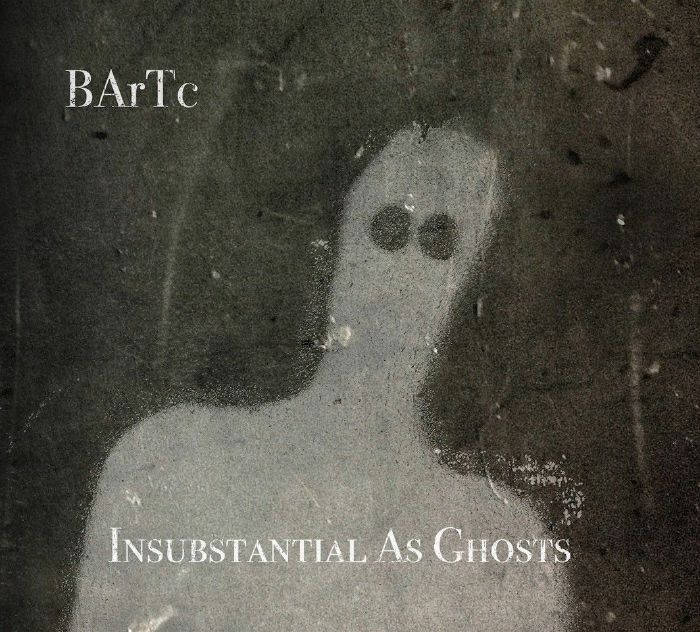
BArTc – Insubstantial As Ghosts (ICR)
For entirely obvious and understandable reasons, often records from the leftfield world don’t do very much, or offer at least much in the way of variety. They have a tendency to settle into their chosen area and sound palate and hope you’ll join them on whatever astral plane they’re occupying. Not so, however, in the case of London-based producer Jason Barton aka BArTc . His new album Insubstantial As Ghosts, released on the label run by Colin Potter of Nurse With Wound fame, feels like it blurs and blends so many different areas of the ambient/industrial/drone world that it genuinely becomes a trip into the unexpected.
So you get a track like ‘The Isotopes of Yttrium’, which features throbbing bass grumbles a la Autechre or one of GPR’s more industrial acts and lovely controlled feedback not a million miles from LFO’s ‘Tied Up’. But elsewhere there’s the slowly exploding single note harmonic-fest ‘Floods’, echoing the so-called big room ambient of guitar drone crew Growing or even Spiritualized in ‘Pure Tone’ mode. Or the eerie, minimal slow melt ‘Skookum’, or the slowly crashing waves of feedback of ‘Staring Into The Abyss’ … We could go on. In short, if you love carefully curated electronics balanced out by a healthy dollop noise and chaos, executed with a knack for drama and surprise, then this is the album for you.
BW

Directions – Echoes (Temporary Residence)
Echoes is one of those records with an impact that far outweighs the modest nature of its initial entry into the world. Limited to 1000 copies on release in 1997 (via niche UK alternative label Soul Static Sound), it ostensibly served as a footnote to the limited Directions project spearheaded by Bundy K. Brown. As a veteran from Chicago noise rock and post punk collectives such as Bastro and Gastr Del Sol, Brown went on to help form seminal Windy City group Tortoise before pursuing other nebulous ventures within freeform music. Directions released one full-length release on Thrill Jockey in 1996 and then quietly called time with Echoes, a two-sided single which took a smooth, undulating approach to jazz-informed improvisation with a contemporary verve that sat comfortably alongside the downtempo sounds of the era.
One of the hooks to draw attention to this reissue of a modest cult classic is its high profile co-sign from Kieran Hebden, aka Four Tet. Coming from the sympathetic trajectory of his post-rock group Fridge, Hebden credits Echoes as a major inspiration for the start of his work as Four Tet, and it’s not hard to discern. The sultry sax, meditative percussive groove and mellifluous double bass meanderings sound like a shoe-in for the debut Four Tet album Dialogue. But where Hebden explored electronic processes in this context, Echoes has a loose, dubby, organic quality. You can sense the mood in the room as the track was laid down – it’s music of this earth, even if it travels far across its 10-minute run time.
As well as the original ‘Continental Drift’ and ‘Asymmetrical Excursion’ versions of the piece, this new reissue also gifts us a 1995 demo of the piece which is as ascendant as the more polished final takes. Interestingly, there’s also a remix from Deadly Dragons, a collection of Chicago experimenters reformed remotely to create a dizzying patchwork version wholly in the spirit of the scene the original release emerged from. This is how reissues should be done, bringing a special, seminal piece of music back within reach and deepening the experience for those who have held it close for more than 20 years.
OW
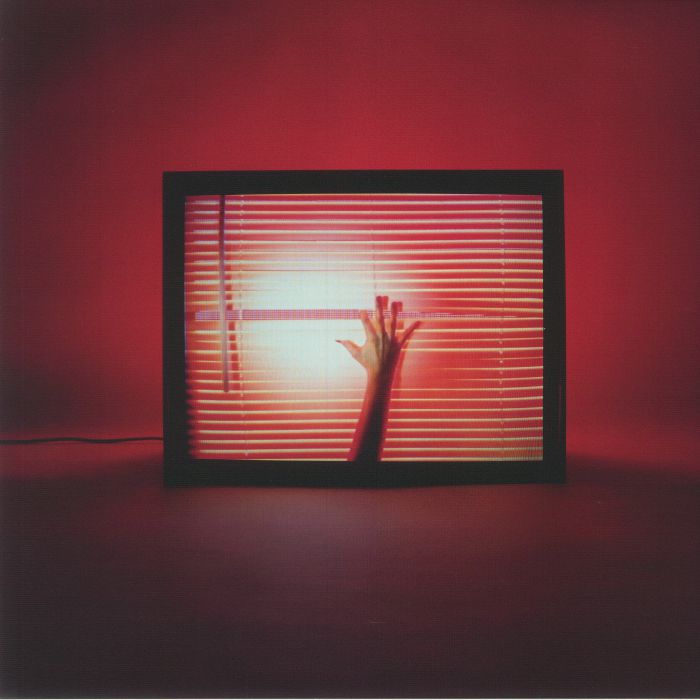
Chvrches – Screen Violence: (Virgin)
Returning freshly from their dream collab (a give-and-take remix single release with horror soundtracker John Carpenter) Chvrches have finally dropped their fourth album, Screen Violence. The name derives from the internal horror and disassociation felt when witnessing violence on a screen, and – interestingly enough – was an early alternative to the band’s name. Let’s not kid ourselves, we can relate to it: their main synthstrumentalist Martin Doherty said that at the time of the album’s making, “half of our lives were lived through screens”.
This album delves deepest into a style that, ideally, Chvrches would have explored earlier in their career. It reminds us of Nero or Chromatics’ future retroism, while standing out as their most unashamedly ‘produced’ album yet. Not esoteric or challenging, the appeal of ‘Screen Violence’ rather comes from its overwhelming, horrific, glassy climaxes, especially when they’re paired with Lavren’s self-conscious and internal monologuing lyrics. Aside from the infectious pre-release single ‘He Said She Said’, our favourite moments centre on the militant breakbeats of ‘Violent Delight’ – on which Mayberry contemplates her own invasive, guilty thoughts – and ‘Lullabies’ – on which we are reminded that “lullabies don’t comfort me… televise the great disaster / better off inside a screen.”
And, capitalising on the ‘80s nostalgia of the day, ‘How Not To Drown’ features a guest vocal contribution by none other than Robert Smith of The Cure. But Chvrches revel in this nostalgic post-cynicism; why watch Stranger Things for our horror fix? Our own waking lives – if not for the filtrating power of screens – are bingeworthy enough.
JIJ
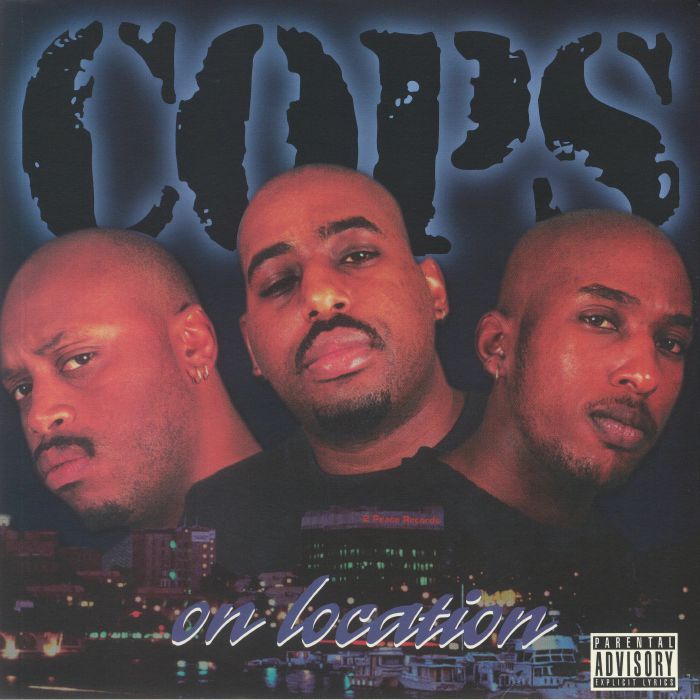
Cops – On Location (Hip Hop Enterprise)
COPS stands for ‘Criminals Over Powerin Society’ – an acronym that more or less sums up the philosophy of this late ‘90s Californian rap trio. Through tasteful Memphis-inspired drawls and slapping productions, 1997 was the year that they successfully nailed down an intriguing thought – are the police no better than your regular old gang?
COPS stands for ‘Criminals Over Powerin Society’ – an acronym that more or less sums up the philosophy of this late ‘90s Californian rap trio. Through tasteful Memphis-inspired drawls and slapping productions, 1997 was the year that they successfully nailed down an intriguing thought – are the police no better than your regular old gang?
JIJ

Various Artists – Second Wave (Random Numbers)
Italian label Random Numbers are doing a sterling job of cultivating a culture around contemporary cold wave. In truth, terms like cold wave, synth wave, minimal wave and so forth are a little vague, variously referring to lo-fi bedroom producers making gothic music on budget set ups or high-impact analogue death disco deviants. The overarching theme is one of noirish fantasy spelt out with a vintage accent, in thrall to the rigidity of the sequencer and aiming for a dark basement lit in red. Random Numbers hasn’t been stuck just on that kind of sound – artists like Healing Force Project, and Wang Inc. have pointed to a broader outlook at times – but on this latest compilation, the mood is positively ghoulish, and all the better for it.
Optimo regular Mr TC open proceedings up with a tense, cinematic stalker titled ‘Phosphorus’, while Knekelhuis’ Patricia Kokett nudges up the tempo and straps on to a sturdy 4/4 juggernaut of rhythm. So far, so solid, but it’s with the third track by Eylül Deniz that things get really interesting. ‘Distance’ is a truly captivating piece which capitalises on space and patience, using sparse, ritualistic motifs as a vessel for Deniz’s vocal imprint. It’s more akin to Cocteau Twins than anything techno-related, and instantly raises the bar of the compilation. In the wake of that track, label co-founder BXP’s ‘In Un Altro Loop’ takes on a more profound tone, while Houschyar’s Laurie Anderson-style 80s sampledelia perfects the art of intentionally synthetic exotica. There’s a lot to unpick from each individual piece, but more important is the overall feeling of theatrical darkness, and the inventive ways in which synthesisers and drum machines can be used to express it.
OW
This week’s reviewers: Oli Warwick, Jude Iago James, Ben Willmott. Patrizio Cavaliere